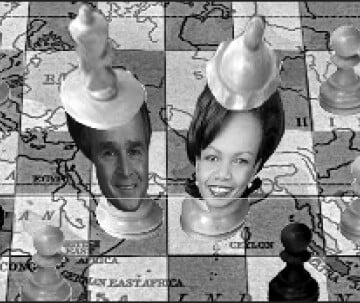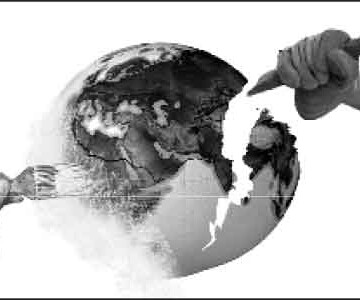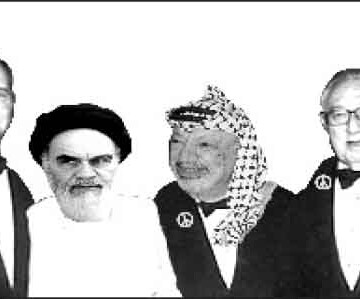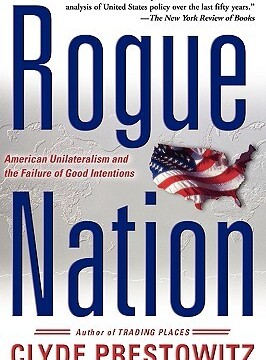American soldiers stumble upon a secret dungeon and discover dozens of emaciated prisoners—173 of them, to be precise—who had simply vanished from the face of the Earth over the previous weeks and months. Horrified GIs walk wide-eyed through the stinking chamber of horrors whose inmates grasp with difficulty that their ordeal is over. Most of...
Author: Srdja Trifkovic (Srdja Trifkovic)
History Is Contemporary
Alex Dragnich’s attempt to compress a multifaceted millennium of Serbian history into 160 pages is bold and could be considered audacious in a lesser man. So much has to be left out, and what is included has to be treated with such economy and such precision, that many a professional would cringe at the task....
Trouble With Iran
Iran’s President Mahmoud Ahmadinejad declared on October 26 that “Israel must be wiped off the map.” Invoking the words of Ayatollah Khomeini, he told an audience of 4,000 cheering students that a new conflict in Palestine would soon remove “this disgraceful blot from the face of the Islamic world.” The statement, made in the midst...
Jihad’s Enablers
Almost 80 years ago, Julien Benda published his tirade against the intellectual corruption of his time, La Trahison des Clercs. The “scribes” in question are those who traffic in words and ideas. For generations before the 20th century, Benda wrote, members of the Western intellectual elite made sure that “humanity did evil, but honored good.”...
Afghanistan’s Democratic Process
George W. Bush bailed last September’s parliamentary election in Afghanistan as “a major step forward” for the country’s democratic process. When the results were published at the end of October, however, it became obvious that the Wolesi Jirga (Lower House) will be dominated by warlords, veteran jihadists, and former Taliban officials. The new legislature will...
Intifada in France
The northern industrial suburbs of Paris suffered the worst of eight consecutive nights of rioting on November 3-4. Disorder has now spread to dozens of provincial towns, including Dijon, the first city outside Ile-de-France (the metropolitan region) to be affected by unrest. Hundreds of cars, as well as schools, stores, and warehouses have been torched or...
An Unsteady Empire
August 29, 2005, the day when hurricane Katrina hit the Gulf Coast, may have marked the beginning of the end of the American Empire. Four years after the horrors in New York and Washington, D.C., showed the nation’s vulnerability to external attack, the Hobbesian free-for-all in New Orleans demonstrated just how fragile it is internally....
“Global Initiative”
Bill Clinton has summoned “his own mini-General Assembly of presidents, prime ministers, kings and other pooh-bahs” to devise plans for “addressing poverty, global warming, religious conflict and better governance.” The inaugural meeting of what the perjurer in chief modestly calls the Clinton Global Initiative has brought together 800 bigwigs who paid $15,000 each for a...
Intrigue in the Balkans
Having devoted a major part of my working life over the past four years to researching and writing about terrorism, I am alert to the possibility that there are a few people around me who would like to shut me up—for good, if at all possible. The tragic end of Theo van Gogh, slaughtered in...
European Disunion
In early 1980, the Soviet Union appeared to be more powerful than ever before. Its hold over Eastern Europe had been sealed in Helsinki five years previously. Its presence or influence in the Third World was rising, while that of the United States was diminishing. The notion of its eventual demise was dear to a...
Getting China Straight
The challenge that the rise of China presents to the United States is more pressing than any other global issue except for the ever-present threat of jihad. Beijing is rapidly becoming a regional power of the first order, the Asian hegemon that will need to be contained, confronted, or, in some way, appeased. Its ruling...
Iraq: The Way Out
Two years and three months after President Bush announced the end of “major combat operations” in Iraq, the war is far from over. Large areas of the country are affected by an open-ended guerrilla insurgency. Periods of intense violence are followed by brief and temporary lulls. Vice President Dick Cheney asserted on May 31 that...
Aid and Comfort to the Enemy, Part II
In last month’s American Proscenium, I focused on the news that Washington is reaching out to various Islamist activists opposed to the secularist regime of Bashir Assad, and notably to the supposedly “moderate” elements of the Muslim Brotherhood in Syria. The editorial, entitled “Aid and Comfort to the Enemy,” concluded that such policies reflect either...
The Real Issue With the Newsweek Koran Fib
The obvious moral of the Newsweek affair is that journalists, and leftist journalists (the common type) in particular, are habitual liars unworthy of respect. To those of us interested in Balkan affairs, the whole Koran to-do elicits a wry smile. Front-page stories from the 1990’s, including countless fact-free accounts of “Bosnian rape camps,” “Kosovo genocides,”...
Rejecting Proposals
The French and the Dutch rejections of the proposed E.U. constitution by referenda (May 29 and June 1, respectively) shook the European neoliberal federation—though it was unwilling to concede defeat: The European Union’s Luxembourg presidency and the leaders of France and Germany immediately declared that the process of ratifying the charter should proceed in other...
Getting Europe Straight
An American foreign policy based on a national-security strategy consistent with this country’s traditions and values would have three main objectives in relation to Europe. The first would be to promote the preservation of the Old Continent as the cradle of our common civilization, with which North America shares a similar world outlook. The second...
Aid and Comfort to the Enemy
According to an April 2 report published by Intelligence Online, for some months now, Washington has been putting out feelers to various Islamic activists who spearhead the opposition to the Syrian regime. According to this source, American diplomats are also cultivating contacts in Qatar with TV preacher Sheikh Yusuf al-Qaradawi, “with whom they frequently discuss...
The Impact of Islam on the Arab-Israeli Dispute
The role of Islam in the Israeli-Palestinian dispute is a contentious subject with two main schools of thought. One, broadly sympathetic to the Palestinian point of view, treats the conflict in geopolitical and social, rather than ideological or religious, terms. The other, emanating mostly (although not exclusively) from pro-Israeli sources, maintains that the Palestinian cause—even...
A Morbid Quest
Paul Wolfowitz’s nomination by President George W. Bush as the new president of the World Bank has caused a storm of protests from abroad, but the news is good. At his new post, Wolfowitz will not be able to do nearly as much damage as he has done at the Pentagon. That damage has been...
Global Anarcho-Tyranny
The kind of regime that is being imposed on the world by what still passes for the West has two basic forms. The form preferred by the Democratic Party in the United States and by the European Union is multilateralist and therapeutic. The form favored by the people who currently control U.S. foreign policy is...
Territorial Compromise
President George Bush has encouraged Arabs and Israelis to “lay down the past.” “Territorial compromise is essential for peace,” he said. “We seek peace, real peace. And by real peace I mean treaties.” Israelis praised President Bush for promising not to railroad them into any agreements, while the Palestinians believed he showed support for their...
A Glimmer of Hope in the Holy Land
Mahmoud Abbas’s convincing victory in the Palestinian presidential election on January 9 provided a piece of good news in an otherwise somber Middle Eastern landscape. Often described as an old Fatah apparatchik with little charisma and popularity, Abbas managed to win 62 percent of the 775,000 votes cast in the West Bank, East Jerusalem, and...
Rumsfeld Stays
Having provided advice to a number of influential Balkan figures in my time, I know the sense of frustration when sound counsel is overruled in favor of proposals based on error or mendacity. I have been proved right, but only when it was too late: Crown Prince Alexander Kara-djordjevic would have been better off had...
European Bushophobia
The announcement of President George W. Bush’s victory last November 3 was immediately followed by an outpouring of vitriol by a legion of European editorialists and op-ed columnists. The Michael Moore wannabes ranted and raved while the “analysts” whined and wailed. The tone of the former was set by a Fleet Street tabloid, the Daily...
Obstacle to Fresh Vision
Yasser Arafat, the president of the Palestinian Authority, is dead. While he was alive, he was an obstacle to any fresh vision for peace in the Middle East. Vainglorious and shifty (he changed his mind about his place of birth thrice), he was unattractive as the “icon” of Palestinian aspirations. His ineffectiveness as an administrator...
The Jihadist Fifth Column: The Cure
Contrary to numerous optimistic assurances from high places, three years after September 11, the reach and operational capability of Islamic terror cells remain strong. They are present in areas previously closed to the recruiters of future “martyrs”—notably in Iraq—and in countries where, only a decade ago, they did not have a significant presence (e.g., Indonesia). ...
After Beslan: Change Course on Russia
It is hardly possible to envisage an orgy of terrorist savagery more depraved than that staged by Chechen jihadists and their foreign cohorts, who butchered, tortured, and raped hundreds of Russian children in the town of Beslan last September. The bloodbath at School No. 1 came at the end of a week in which two...
Redeployment of U.S. Forces Overseas: Long Overdue, Too Slow
Many Central Europeans who are now in their late middle age or older have fond memories of American soldiers in their midst. In France in 1944, nylon stockings and chocolates were the tools of seduction, resented by men and welcomed by ladies. In Germany in early 1945, the G.I. came to be seen as liberator,...
Former World Chess Champion
Bobby Fischer, the former world chess champion who is wanted by the U.S. government for allegedly defying U.N. sanctions by playing a match in Yugoslavia in 1992, was detained at Tokyo’s Narita airport on July 15 as he tried to leave for the Philippines. Fischer was traveling on a passport that the State Department says...
The Perils of “United Europe”
A visitor to Prague in the immediate aftermath of the Czech Republic’s formal entry into the European Union will find few outward signs that something rather momentous has taken place. Your documents are still checked at the border crossing as you drive into the country from Germany; the koruna (crown) is still the legal tender;...
Consequences of E.U. Enlargement
The European Union underwent a major transformation last May. It was enlarged to 25 states when eight former communist countries—Poland, the Czech Republic, Hungary, Slovakia, Slovenia, and three Baltic republics—were formally admitted, as well as Malta and Cyprus. The union is now a political and economic giant of 450 million people, the largest single market...
“No Credible Evidence”
The September 11 Commission (the National Commission on Terrorist Attacks Upon the United States) has found “no credible evidence” of a meaningful link between Iraq and Al Qaeda. Flatly contradicting claims by the Bush administration that such a connection justified the war in Iraq, the commission’s preliminary report released on June 16 says that Osama...
CAIR and the ADL: Partnership for Hate
At the tail end of the Russian Revolution, Lenin mocked some Mensheviks for protesting that they were not permitted to express their views in public: “Permit us to put you before a firing squad for saying that. Either you refrain from expressing your views, or, if you insist on expressing your political views publicly ....
Failing America
The Soviet Communist Party used to devote a lot of attention to the problem of inefficient agriculture. The party’s Agrarian Policy Commission debated endlessly, throughout the final quarter-century of the Soviet state’s existence, how to improve the system. Should the state farm (sovkhoz) be made self-financing? Should the collective farm (kolkhoz) have its own heavy...
Violence in Iraq
Violence in Iraq has, since the end of “major combat operations,” been largely identified with the “Sunni Triangle” in the center of the country. The Shia—who make up almost two thirds of Iraq’s 25 million people—were glad to see Saddam fall. They were prepared to accept the occupation and cooperate with the new authorities on...
Europe and America
Studies have established that identical twins separated at birth exhibit very similar physical, psychological, and biochemical traits, regardless of the environment in which they grow up. They will have similar voices, gestures, tastes, incomes, professions, wives—and similar diseases. A twin adopted by an Italian firefighter from New Jersey and his brother reared by a Jewish...
Elephant Amok
This book joins dozens of others that have been written over the past two years with the goal of subjecting President George W. Bush’s foreign policy to critical scrutiny. Clyde Prestowitz’s objections are often justified—notably on the Middle East—and stated with clarity. His recommended remedies reflect a strong One World liberal bias, however, while failing...
The Victory of Fear in Spain
If, as appears certain, Islamic terrorists planted the bombs that killed over 200 commuters and wounded 1,400 others on Madrid’s trains on March 11, the operation was singularly successful in achieving its political objectives. Until that morning, the Popular Party (PP) government of the former prime minister José Maria Aznar looked poised to win the...
The Assassination of Yassin
Israel’s assassination on March 22 of Sheik Ahmad Yassin, founder of the Hamas militant group in the Gaza Strip, has prompted Arab calls for revenge against Israeli and American targets. His funeral in Gaza City, attended by more than 100,000 people, reflected a new tide of militancy throughout the region. New Hamas leader Abdelaziz Rantissi...
Pakistan’s Nuclear Proliferation
In a speech at the National Defense University in Washington, D.C., on February 11, President Bush warned against the spread of nuclear, biological, and chemical weapons and suggested measures to dismantle a growing black market in nuclear fuel and technology. He called the possibility of a sudden attack by weapons of mass destruction “the greatest...
The Balkan Terror Threat
A chain is as strong as its weakest link. In President Bush’s “War on Terror,” that weak link is not in the Middle East or North Africa or the Subcontinent but in Europe. For years, Chronicles has been warning that flawed pro-Muslim Western policies would turn the Balkans from a “protectorate of the New World...
The Battle for Bush’s Ear and Soul
It is reasonable to assume that a country’s foreign policy is conducted in the interest of that country’s security and well-being and that those entrusted with its formulation and conduct will act in a coherent and rational manner. At the end of 2003, the foreign policy of the United States was neither coherent nor rational. ...
George Soros, Postmodern Villain
George Soros was born in Budapest in 1930 but, today, spends most of his time in New York City. Not much is known about his early years. He is the only eminent “holocaust survivor” who has been accused of collaboration with the Nazis. In 1947, he managed to sneak through the Iron Curtain, and, the...
Mr. Bush and Democracy in the Middle East
In 1980, Ayatollah Khomeini told Oriana Fallaci that Western music dulls the mind. “It involves pleasure and ecstasy, similar to drugs,” he explained; it does not exalt the spirit but puts it to sleep, and “it distracts our youth who become poisoned by it.” “Even the music of Bach, Beethoven, Verdi?” Fallaci asked. “I do...
Lord Ashdown’s Balkan Fiefdom
For 200 years, the Balkan states have been manipulated by the powers of “Old Europe” to slow and control the collapse of the Ottoman Empire. They were created, enlarged, and shrunk as the need arose. During the two world wars, the territories inhabited by southern Slavs were used as bargaining chips in constructing alliances, while...
Out of Korea
Another futile round of the six-nation talks on North Korea’s nuclear program ended in Beijing last September. The communist authorities in Pyongyang subsequently declared that further negotiations involving both Koreas, China, Japan, Russia, and the United States were pointless, but China said it was working to arrange a second round of talks. For once, I...
The Iraq Quagmire
The lies and distortions surrounding the stated rationale for the war against Iraq now appear crude, clumsy, and embarrassing. While it would have been unrealistic to expect Messrs. Bush, Rumsfeld, and Wolfowitz to display Bismarckian finesse in setting up Saddam Hussein, six months after the war was declared over, their actions should be judged by...
Reforming the Military
On August 25, Secretary of Defense Donald Rumsfeld announced that he would look into ways to strengthen U.S. combat power without increasing the size of the military. While the “end-strength” of 1.4 million should stay the same, he intends to rebalance the active and reserve components, sending underutilized active-duty personnel to the reserves and moving...
Out of Africa
But for the death and suffering it has caused to thousands of innocents, the Liberian imbroglio would have an almost farcical quality—Graham Greene meets Lehar. On one side, there was the LURD (Liberians United for Reconciliation and Democracy), a ragtag army of heavily armed but poorly trained and undisciplined rebels. They nevertheless have the upper...
Exiting Iraq
It is sometimes necessary for a great power to keep a distant small country under military occupation—if need be, for a very long time. The Romans could not contemplate an “exit strategy” from Palestine in the first century A.D.—or from a few other hotspots around the empire’s outer perimeter—without compromising their status as the world’s...





